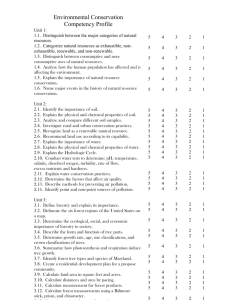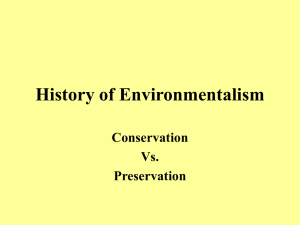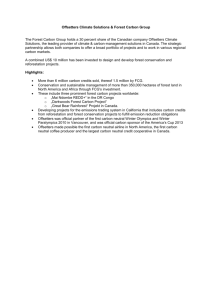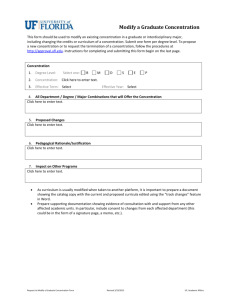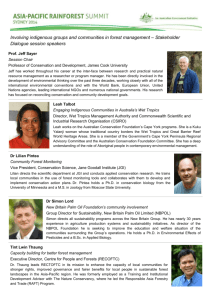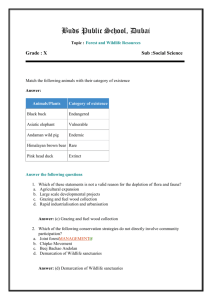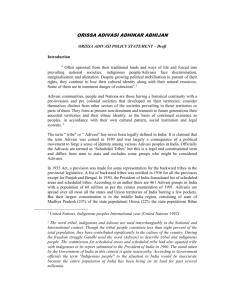Campaign for survival and dignity
advertisement
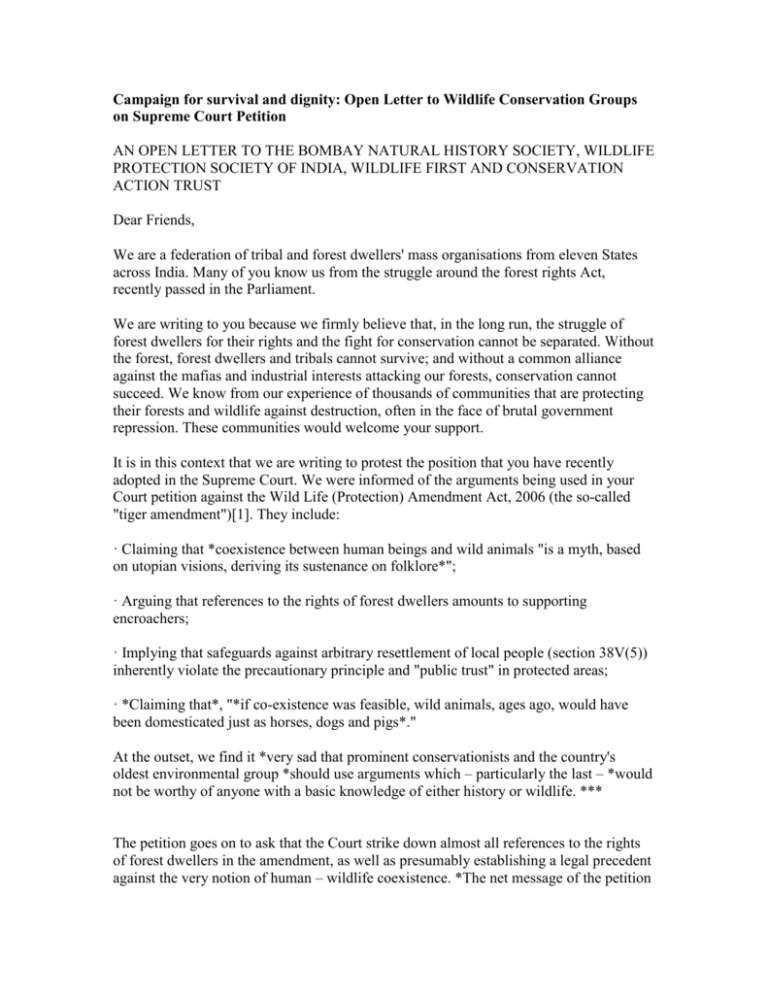
Campaign for survival and dignity: Open Letter to Wildlife Conservation Groups on Supreme Court Petition AN OPEN LETTER TO THE BOMBAY NATURAL HISTORY SOCIETY, WILDLIFE PROTECTION SOCIETY OF INDIA, WILDLIFE FIRST AND CONSERVATION ACTION TRUST Dear Friends, We are a federation of tribal and forest dwellers' mass organisations from eleven States across India. Many of you know us from the struggle around the forest rights Act, recently passed in the Parliament. We are writing to you because we firmly believe that, in the long run, the struggle of forest dwellers for their rights and the fight for conservation cannot be separated. Without the forest, forest dwellers and tribals cannot survive; and without a common alliance against the mafias and industrial interests attacking our forests, conservation cannot succeed. We know from our experience of thousands of communities that are protecting their forests and wildlife against destruction, often in the face of brutal government repression. These communities would welcome your support. It is in this context that we are writing to protest the position that you have recently adopted in the Supreme Court. We were informed of the arguments being used in your Court petition against the Wild Life (Protection) Amendment Act, 2006 (the so-called "tiger amendment")[1]. They include: · Claiming that *coexistence between human beings and wild animals "is a myth, based on utopian visions, deriving its sustenance on folklore*"; · Arguing that references to the rights of forest dwellers amounts to supporting encroachers; · Implying that safeguards against arbitrary resettlement of local people (section 38V(5)) inherently violate the precautionary principle and "public trust" in protected areas; · *Claiming that*, "*if co-existence was feasible, wild animals, ages ago, would have been domesticated just as horses, dogs and pigs*." At the outset, we find it *very sad that prominent conservationists and the country's oldest environmental group *should use arguments which – particularly the last – *would not be worthy of anyone with a basic knowledge of either history or wildlife. *** The petition goes on to ask that the Court strike down almost all references to the rights of forest dwellers in the amendment, as well as presumably establishing a legal precedent against the very notion of human – wildlife coexistence. *The net message of the petition is that the rights of local people are dispensable *(even where they are fundamental rights) *in the interests of the absolute power of forest and wildlife authorities, which is equated with conservation*. We do not want to engage with the legal merits of your petition. There are indeed ambiguities in the amendment. But these ambiguities cannot be settled by sweeping arguments against people's rights. These arguments reek of elitism, ignorance and narrow-mindedness. Estimates say that more than 4 million people live in this country's protected areas. The Tiger Task Force estimated that tiger reserves alone have more than 1500 villages inside them, and describes how tiger reserves have been declared without settling or respecting the rights of those living in these areas (violating even the existing provisions of the Wild Life (Protection) Act). "Selective interpretation of the law", it says, is leading to "huge conflicts" and "a war within," including extreme poverty and oppression. It is not an accident that India's forest dwellers are our poorest and most marginalised communities. It is for these reasons that this amendment makes some hesitant and ambiguous steps towards protecting forest dwellers' rights. *You may disagree with these positions, but you cannot dismiss them as irrelevant – unless millions of people's lives are also to be deemed irrelevant. *** Meanwhile, *international law and conservation practices have moved far beyond the anti-democratic and anti-people positions that you adopt*. In fact, *the IUCN – the world's largest conservation organisation, of which two of you (BNHS and WPSI) are members – takes exactly the opposite position *to yours. The "Durban Accord" emerging from the IUCN World Parks Congress in 2003, where a BNHS representative was present, stated that "we urge commitment to the integral relationship of people with protected areas, fully incorporating the rights, interests and aspirations of both women and men, ... [and] to involve local communities, indigenous and mobile peoples in the creation, proclamation and management of protected areas." The Congress also made a specific recommendation that stated, *inter alia*, that "effective and sustainable conservation can be better achieved if the objectives of protected areas do not violate the rights of indigenous peoples living in and around them...successful implementation of conservation programmes can only be guaranteed on a long-term basis when there is consent for, and approval by, indigenous peoples among others..." Nor is the IUCN the only body to take such positions. The Convention on Biological Diversity, which India has signed, also requires that the rights of indigenous and local communities be respected. It is now a settled principle of international law that protected areas must respect community rights. Would you describe even the IUCN and the CBD as peddlers of myths and folklore? Does the BNHS wish to repudiate the World Parks Congress at which its own representative was present? The reality is that the tiger amendment is the first wildlife law that explicitly tries to curb the autocratic power of the Forest and wildlife departments over the forest, its resources and people's lives. How this should be done can be a matter of debate and dialogue. *Attacking the entire notion of people's rights, however, is irresponsible, dangerous and harmful not only to forest dwellers but to conservation itself.* For in the long run, the longer that conservationists place their faith in an authoritarian system of forest conservation, the longer they try to tar all forest dwellers with the brush of being criminals, so much weaker will conservation itself become. Conservation cannot survive without the support of ordinary people. If you truly believe in either forest rights or forest conservation, we would request you to withdraw your petition, open a dialogue on the issues that you raise and be willing to consider a democratic approach to conservation in which both wildlife and people's rights are given importance. *If your approach, however, is to condemn all forest dwellers and tribals to decades more of repression under draconian laws and authoritarian "conservation", then you are neither friends of conservation nor friends of forest peoples. *We hope you would choose the former. Sincerely, On behalf of the Convening Collective * *** *Bharat Jan Andolan, National Front for Tribal Self Rule, Jangal Adhikar Sangharsh Samiti (Mah), Adivasi Mahasabha (Guj), Adivasi Jangal Janjeevan Andolan (D&NH), Jangal Jameen Jan Andolan (Raj), National Forum of Forest Peoples and Forest Workers, Madhya Pradesh Van Adhikar Abhiyan (MP), Jan Shakti Sanghatan (Chat), Peoples Alliance for Livelihood Rights, Chattisgarh Mukti Morcha, Orissa Jan Sangharsh Morcha, Campaign for Survival & Dignity (Ori), Orissa Adivasi Manch, Orissa Jan Adhikar Morcha, Adivasi Aikya Vedike (AP), Budakattu Krishikara Sangha (Kar), Campaign for Survival and Dignity – TN, Bharat Jan Andolan (Jhar).* -----------------------------[1] <#1104fae39af448be__ftnref1> WP 514/2006, *Bombay Natural History Society and Ors. vs. Union of India and Ors. * *CAMPAIGN FOR SURVIVAL AND DIGNITY** * National Convenor: Pradip Prabhu, 3, Yezdeh Behram, Kati, Malyan, Dahanu Rd. 401602. Delhi Contact: SRUTI, Q-1 Hauz Khas Enclave, New Delhi 110 016. Ph:9968293978, 26569023. forestcampaign@gmail.com Source: http://openspace.org.in/node/480
